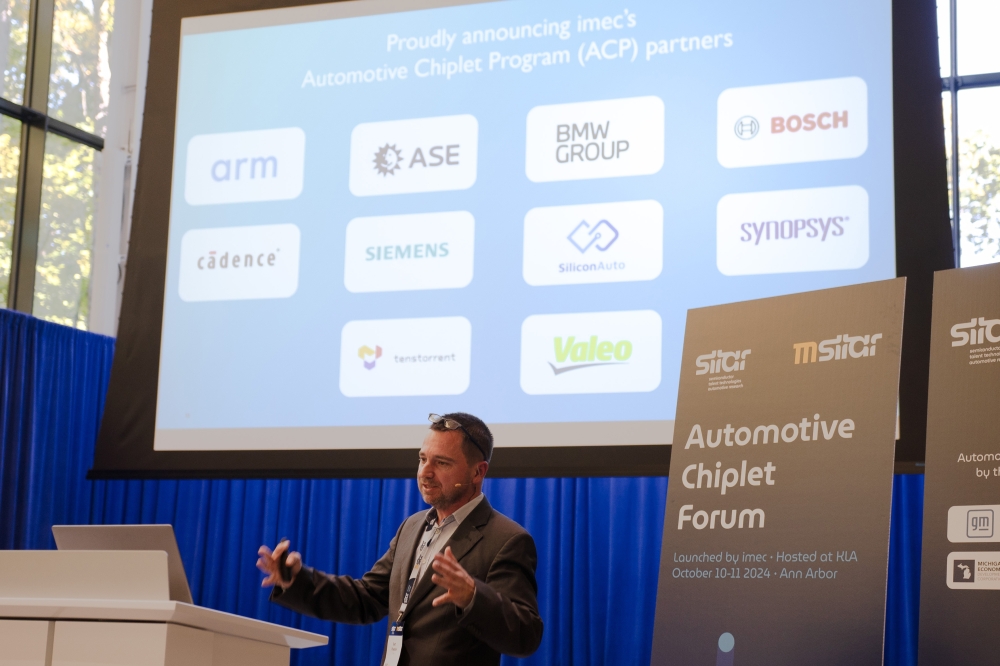imec accelerates Automotive Chiplet Program

Arm, ASE, BMW Group, Bosch, Cadence, Siemens, SiliconAuto, Synopsys, Tenstorrent and Valeo commit to join imec's effort to mutually explore the opportunities presented by chiplet technology.
At a recent gathering in Ann Arbor (MI), bringing together the global automotive ecosystem to discuss the evolution towards chiplets in cars (Automotive Chiplet Forum 2024), imec announced that Arm, ASE, BMW Group, Bosch, Cadence Design Systems, Inc., Siemens, SiliconAuto, Synopsys, Tenstorrent and Valeo are the first that have committed to join its Automotive Chiplet Program (ACP). The program brings together stakeholders from across the automotive ecosystem in a pre-competitive research effort unparalleled in the car manufacturing industry. The program’s goal is to evaluate which chiplet architectures and packaging technologies are best suited to support car manufacturers' specific high-performance computing and strict safety requirements, while striving to extend the benefits of chiplet technology – such as increased flexibility, improved performance and cost savings – to the entire automotive industry.
Car makers have been integrating chip technology into their vehicles since the late 1970s. Lately, however, traditional chip architectures have struggled to meet the requirements of ever more demanding automotive solutions, such as advanced driver assistance systems (ADAS) and immersive in-vehicle infotainment (IVI) services. Enter chiplets – i.e., modular chips that are specifically designed to perform specialized functions efficiently and can be seamlessly combined to create more sophisticated compute systems.
“The adoption of chiplet technology would signal a disruptive shift in central vehicle computer design, offering distinct advantages over traditional monolithic approaches. Chiplets facilitate rapid customization and upgrades, while reducing development time and costs,” explained Bart Placklé, vice-president of automotive technologies at imec. “However, moving to a chiplet architecture is prohibitively expensive for OEMs if done in isolation. Commercial viability thus hinges on industry alignment around a set of chiplet standards, enabling car manufacturers to procure chiplets from the market and integrate them with proprietary chiplets to build unique offerings.”
In search of a chiplet architecture that combines performance, energy efficiency, robustness, cost effectiveness and customization
Companies developing supercomputing, data center and smartphone solutions have long explored the benefits of chiplet technology to meet their rapidly increasing computing needs. But the automotive industry has been somewhat more reluctant to embrace the chiplet paradigm due to the unique challenges they face.
First, automotive solutions must meet strict robustness and reliability requirements, ensuring continuous operation and passenger safety over a car's typical lifespan of ten to fifteen years. Moreover, cost is another crucial factor to consider. And, finally, superior performance and exceptional energy efficiency are critical to preserving a car's battery life. These are some of the urgent issues imec's Automotive Chiplet Program will address.
A pre-competitive, collaborative research effort unparalleled in the automotive industry
Imec’s Automotive Chiplet Program leverages imec’s world-leading track record in advanced 2.5D and 3D packaging with resources and expertise from different parts of the automotive value chain. Bart Placklé: “The agility of chiplets will allow the automotive ecosystem to respond quickly to changing market demands and technological breakthroughs. They also facilitate flexible component integration, limiting the risk of vendor lock-in and improving supply chain resilience. In addition, their optimized performance leads to lower power requirements, enabling compact device design.”
“We are convinced that all stakeholders will gain important insights from the program’s pre-competitive, collaborative approach – leveraging the partners’ collective wisdom and means to make rapid progress. The valuable precompetitive learnings from the program can be instantiated in further R&D and product innovation to accelerate the partners’ own differentiating, long-term roadmaps. In fact, this methodology mirrors the successful practices established in the semiconductor industry over the past four decades. With 40 years of experience in designing, building, and optimizing chip architectures and technologies, and without allegiance to any stakeholder in the automotive ecosystem, imec is uniquely positioned to guide the car manufacturing industry towards the development of a groundbreaking new chiplet architecture tailored to the sector’s specific needs,” he concluded.

































